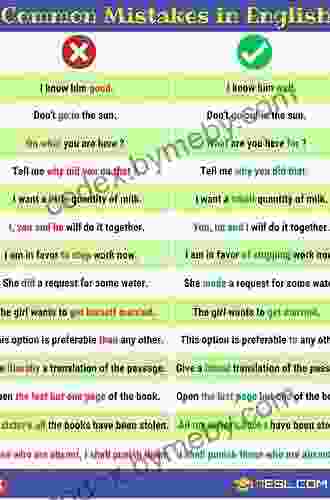The Most Common Mistakes in English: A Comprehensive Guide

English, a language of global communication and cultural significance, presents a wealth of nuances and intricacies for learners. Navigating its complexities can be a journey filled with challenges and triumphs. However, certain errors tend to persist among English speakers, regardless of their proficiency level. These mistakes, often rooted in the subtle differences between languages, can hamper communication and hinder language acquisition.
4.4 out of 5
| Language | : | English |
| File size | : | 1737 KB |
| Text-to-Speech | : | Enabled |
| Screen Reader | : | Supported |
| Enhanced typesetting | : | Enabled |
| Word Wise | : | Enabled |
| Print length | : | 168 pages |
| Lending | : | Enabled |
This comprehensive guide delves into the most common mistakes made in English, providing clear explanations, illustrative examples, and practical tips to help you overcome these linguistic pitfalls. By shedding light on these prevalent errors, we aim to empower learners to self-correct, refine their language skills, and achieve greater proficiency in spoken and written English.
Mistakes in Grammar
Subject-Verb Agreement
Subject-verb agreement is a fundamental rule of grammar, ensuring that the verb in a sentence matches the number and person of its subject. Common errors arise when the subject is separated from the verb by a phrase or clause, leading to an incorrect verb form. For instance, saying "The group of students were excited" is incorrect; the correct form is "The group of students was excited" since the subject "group" is singular.
Tense Consistency
Tense consistency requires using the appropriate verb tense throughout a sentence or passage. Incorrectly switching between past, present, and future tenses can create confusion and impair comprehension. A common mistake involves mixing past and present perfect tenses, such as saying "I had walked to the store and bought a loaf of bread." The correct form would be "I walked to the store and bought a loaf of bread" or "I had walked to the store and had bought a loaf of bread."
Pronoun Misuse
Pronouns serve as placeholders for nouns, referring to specific people or things in a sentence. Misusing pronouns can lead to ambiguity and make it difficult for readers or listeners to follow. A typical error involves using the wrong case of a pronoun, such as saying "Me and my friend went to the park" instead of "My friend and I went to the park." Additionally, confusing singular and plural pronouns can create grammatical problems, as in saying "The team is excited about their upcoming game" (incorrect) versus "The team is excited about its upcoming game" (correct).
Mistakes in Vocabulary
Confusing Similar Words
The English language abounds with words that sound or look similar but have distinct meanings. These words, often referred to as homophones or homographs, can easily trip up learners. For instance, "their," "there," and "they're" are three words that frequently cause confusion. Similarly, "effect" (noun) and "affect" (verb) are often used interchangeably, leading to grammatical errors.
Using Incorrect Adverbs
Adverbs modify verbs, adjectives, or other adverbs, adding detail or emphasis to a statement. Misusing adverbs, particularly when confusingly similar words exist, can alter the intended meaning of a sentence. A common error involves using "good" instead of "well" when modifying verbs, such as saying "I feel good" (correct) versus "I feel well" (incorrect). Another common mistake is confusing "bad" and "badly," as in saying "I did badly on the test" (correct) versus "I did bad on the test" (incorrect).
Inaccurate Idioms
Idioms are expressions that have a figurative meaning that cannot be understood directly from the individual words. Misusing idioms, whether by altering their structure or using them in the wrong context, can create awkward and confusing language. A frequent error involves using the idiom "all of a sudden" instead of "suddenly," which conveys a more immediate and unexpected occurrence.
Mistakes in Style and Usage
Redundant Phrases
Redundancy occurs when a phrase or expression uses unnecessary words that repeat or add no additional information. Eliminating redundant phrases can enhance clarity and conciseness in writing and speaking. For instance, saying "I saw it with my own two eyes" is redundant because "saw" already implies seeing with one's eyes. Similarly, using phrases like "true facts" or "past history" is unnecessary since "facts" and "history" are inherently true and past.
Passive Voice Overuse
Passive voice shifts the focus of a sentence away from the agent of an action to the object. While passive voice can be useful in certain situations, excessive use can make writing or speech sound weak and indirect. A common mistake is using passive voice unnecessarily, such as saying "The ball was kicked by the player" instead of "The player kicked the ball." Overusing passive voice can make it difficult for readers or listeners to identify who or what is performing the action.
Incorrect Punctuation
Proper punctuation is crucial for clarity and comprehension in written English. Common punctuation errors include using commas incorrectly, neglecting to use apostrophes for possessive forms, and misplacing quotation marks. For instance, missing a comma after an introductory phrase can create confusion, as in saying "After the game we went to the park" (incorrect) versus "After the game, we went to the park" (correct). Similarly, failing to use an apostrophe in a possessive noun can change the meaning of a sentence, such as saying "The students book" (incorrect) versus "The student's book" (correct).
Overcoming Common Mistakes
Self-Reflection and Practice
The first step towards overcoming common mistakes in English is to become aware of your errors. Pay attention to your speech and writing, and take note of any recurring patterns of mistakes. Once you have identified the areas where you need improvement, make a conscious effort to correct them. Practice speaking and writing in English regularly, and seek feedback from others to help you identify and address your mistakes.
Utilize Resources
Numerous resources are available to help you improve your English language skills. Dictionaries, grammar books, and online grammar checkers can provide you with information and guidance on correct usage. Consult these resources whenever you encounter an unfamiliar word or grammar point, and make a note of any new or confusing concepts. Additionally, taking English language classes or working with a tutor can provide personalized instruction and tailored feedback to help you overcome specific challenges.
Immersion and Exposure
Immersing yourself in English-language content can significantly enhance your language proficiency. Read books, articles, and newspapers in English. Watch English-language movies and TV shows. Listen to English-language music and podcasts. By exposing yourself to the language, you will absorb correct usage and improve your understanding of grammar and vocabulary.
Patience and Perseverance
Learning a language is a journey that requires patience and perseverance. Mistakes are inevitable along the way, but they should be viewed as learning opportunities. Don't become discouraged if you make mistakes; instead, use them as a chance to improve and refine your language skills. Keep practicing, seek feedback, and immerse yourself in the language. With consistent effort, you will gradually overcome common mistakes and achieve greater proficiency in English.
Mastering the English language involves a continuous process of learning, practice, and refinement. By understanding the most common mistakes made in English and implementing strategies to overcome them, learners can significantly enhance their language proficiency. Remember, mistakes are an inherent part of language acquisition, and they provide valuable opportunities for growth and improvement.
Embrace the journey of English language learning with enthusiasm and determination. By embracing self-reflection, utilizing resources, immersing yourself in the language, and practicing with patience and perseverance, you will overcome common mistakes and unlock a world of effective communication and linguistic excellence.
4.4 out of 5
| Language | : | English |
| File size | : | 1737 KB |
| Text-to-Speech | : | Enabled |
| Screen Reader | : | Supported |
| Enhanced typesetting | : | Enabled |
| Word Wise | : | Enabled |
| Print length | : | 168 pages |
| Lending | : | Enabled |
Do you want to contribute by writing guest posts on this blog?
Please contact us and send us a resume of previous articles that you have written.
 Book
Book Novel
Novel Page
Page Chapter
Chapter Text
Text Story
Story Genre
Genre Reader
Reader Library
Library Paperback
Paperback E-book
E-book Magazine
Magazine Newspaper
Newspaper Paragraph
Paragraph Sentence
Sentence Bookmark
Bookmark Shelf
Shelf Glossary
Glossary Bibliography
Bibliography Foreword
Foreword Preface
Preface Synopsis
Synopsis Annotation
Annotation Footnote
Footnote Manuscript
Manuscript Scroll
Scroll Codex
Codex Tome
Tome Bestseller
Bestseller Classics
Classics Library card
Library card Narrative
Narrative Biography
Biography Autobiography
Autobiography Memoir
Memoir Reference
Reference Encyclopedia
Encyclopedia Chuck Sutherland
Chuck Sutherland Claire Bond Potter
Claire Bond Potter Elizabeth Heiter
Elizabeth Heiter Christina Klein
Christina Klein Lindsay Derollo
Lindsay Derollo Cindy Seaton
Cindy Seaton Cindy Entin
Cindy Entin Chris Palmer
Chris Palmer Kate Staves
Kate Staves Christina Blizzard
Christina Blizzard Rachel Dodman
Rachel Dodman Chris Lehto
Chris Lehto Chuck Acts
Chuck Acts Christine E Sleeter
Christine E Sleeter Sarah Bond
Sarah Bond Christopher Spinney
Christopher Spinney Sarah Lentz
Sarah Lentz Clarissa Price
Clarissa Price Marcy Kelman
Marcy Kelman Christopher J Lebron
Christopher J Lebron
Light bulbAdvertise smarter! Our strategic ad space ensures maximum exposure. Reserve your spot today!

 Clark CampbellConquer Latin with "The Basic 2000 Word Vocabulary Arranged By Frequency:...
Clark CampbellConquer Latin with "The Basic 2000 Word Vocabulary Arranged By Frequency:... Curtis StewartFollow ·16.1k
Curtis StewartFollow ·16.1k Lord ByronFollow ·7.2k
Lord ByronFollow ·7.2k Jake CarterFollow ·8.9k
Jake CarterFollow ·8.9k Adrian WardFollow ·7k
Adrian WardFollow ·7k Hayden MitchellFollow ·11.3k
Hayden MitchellFollow ·11.3k Orson Scott CardFollow ·2.3k
Orson Scott CardFollow ·2.3k Chinua AchebeFollow ·3.3k
Chinua AchebeFollow ·3.3k Henry HayesFollow ·11k
Henry HayesFollow ·11k

 Rick Nelson
Rick NelsonThe Power of Positivity: 51 Motivational Quotes to...
In the tapestry of life, we encounter...

 Lee Simmons
Lee SimmonsThe Indian War of 1864: A Devastating Conflict in the...
The Indian War of 1864 was a brutal...

 Eddie Bell
Eddie BellQueen: The Unauthorized Biography: Unraveling the Secrets...
Prepare to delve into the captivating...

 Dion Reed
Dion ReedUnveiling the Imperfect Gems of Trauma and...
In the tapestry of...

 Desmond Foster
Desmond FosterThirty-Six Years in the Rockies: A Timeless Masterpiece...
A Journey Through Time and...
4.4 out of 5
| Language | : | English |
| File size | : | 1737 KB |
| Text-to-Speech | : | Enabled |
| Screen Reader | : | Supported |
| Enhanced typesetting | : | Enabled |
| Word Wise | : | Enabled |
| Print length | : | 168 pages |
| Lending | : | Enabled |












